

Postgraduate research
We offer postgraduate research programmes and studentships in almost 40 diverse subject areas across our four Schools.
Our research embraces disciplines as diverse as business, arts, languages and cultures, environment, education and development, and social sciences.
We’re always looking to make an impact with everything we do, with a shared ambition to always do better.
Our internal studentships and funding opportunities have closed for 2024 entry. Self-funded and externally funded students can still apply before the 30 June 2024 deadline.
Sign up to our entry 2025 updates
Interested in MPhil, PhD or other professional doctorate study in 2025? Provide your details for direct updates for admissions webinars, studentship announcements and application guidance.
Programme finder -->
Please select a course.
Postgraduate research programmes
Our subjects
Enter the subject you're interested in to filter the results.
As well as filtering by keyword, you can filter our subjects by School.
- AMBS (Alliance Manchester Business School)
- SALC (School of Arts, Languages and Cultures)
- SEED (School of Environment, Education and Development)
- SOSS (School of Social Sciences)

Accounting and Finance
This PhD programme pathway provides advanced training to develop leading research in Accounting, Market-based Accounting Research (MBAR) and Finance.
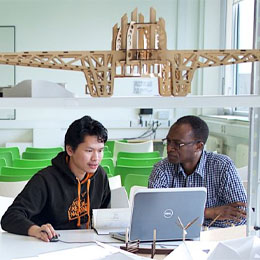
Architecture
Architecture studies at Manchester take place at the Manchester School of Architecture (MSA), one of the top architecture schools in the UK.
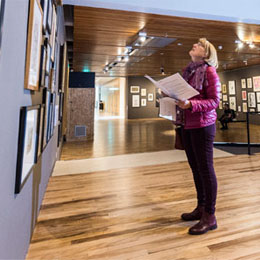
Art History and Cultural Practices
Study modern and contemporary art, architectural history, museum studies, and the intersections of art and science.

Arts Management and Museology
Explore a suite of programmes on museology, heritage, and arts management at the Institute for Cultural Practices (ICP).

Classics, Ancient History, Archaeology and Egyptology
Explore the ancient world, from the Near East and Egypt to the Hellenistic and Roman Empires, with Classics, Ancient History, Archaeology, and Egyptology (CAHAE).
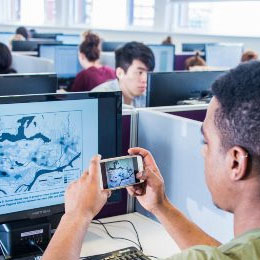
Criminology
Criminology is the study of crime – its measurement and definition, causes and effects, and social implications.
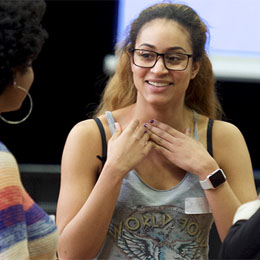
Theatre studies, performance, applied theatre, and screen studies delivered through lectures, seminars, tutorials, and group practical projects.
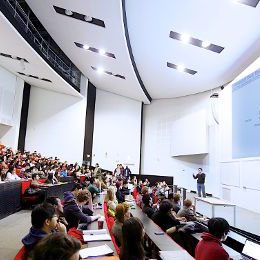
Economics is the study of the way in which incentives affect behaviour, and economists analyse how choices are made and their influence on society as a whole.

Addressing social justice and enabling educational change through scholarly activities and collaborative partnerships with professionals.

English Literature and Creative Writing
Course units range from Anglo-Saxon literature to 21st-century writing and film and cover medieval romance to the postcolonial and postmodern.
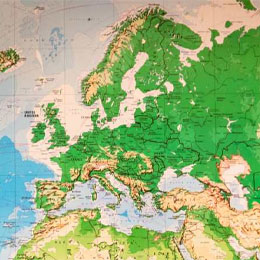
Research and teaching by Manchester geographers set national and international research agendas in human and physical geography.

Global Development
Development courses promote social justice, economic development, and greater equality within countries, particularly for marginalised groups.
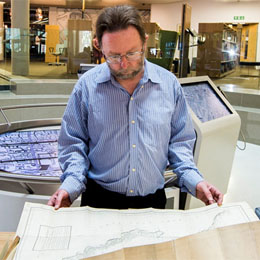
Modern British and European cultural history, economic and social history from the Middle Ages to the 20th century, and the study of late antiquity and the early Middle Ages.
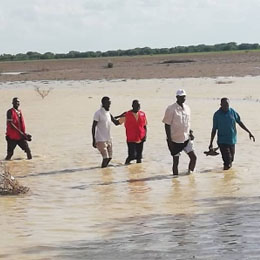
Humanitarian and Conflict Response Institute
Leading global institute for the study of humanitarianism and conflict response, global health, international disaster management, and peacebuilding.

Innovation, Management and Policy
The division is one of the largest research groups for innovation management and policy globally.

Explore opportunities to learn about today’s legal issues in one of the most diverse cities in the UK, and gain the skills to pursue a law-related profession.
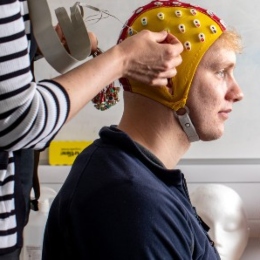
Linguistics and English Language
Study topics as diverse as dialects, Old English, children's language, and the speech of men and women.

Management, Sciences and Marketing
Research in the Division ranges from studies to understand consumer motivations and influences to understanding markets, operational, informational and digital systems.

Modern Languages and Cultures
Our Modern Languages provision is amongst the broadest and most diverse in the UK, featuring more than 100 different subject combinations.

Our research and teaching covers composition (instrumental and vocal), electroacoustic composition and computer music, ethnomusicology, musicology, and performance.

People, Management and Organisations
The division brings together internationally-recognised experts in work and employment, organisational psychology, international business, health policy and organisations in society.
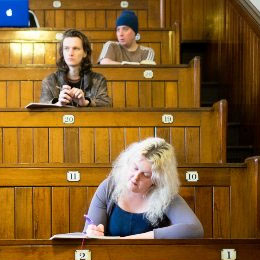
Our research and teaching areas include analytic philosophy, with emphasis on metaphysics, aesthetics, ethics, epistemology, the history of philosophy, and the philosophy of mind.

Planning, Property and Environmental Management
Planning, Property and Environmental Management covers spatial analysis, politics and planning, governance, sustainable urbanism, and urban research.

Politics at Manchester is one of the strongest groupings in the UK with a distinguished history as a centre of research, training, and education at undergraduate and postgraduate levels.

Religions and Theology
Study of the beliefs, texts, practices, histories, and cultures of the great religious traditions: Judaism, Christianity, Islam, Hinduism, and Buddhism.

Social Anthropology
The study of social and cultural diversity, including conflict and its aftermath, economic change, poverty, inequality, globalisation, sex, gender, identities, and the material world.

Social Statistics
Developing statistical methods for longitudinal and multilevel data, longitudinal survey data, social networks, statistical disclosure and confidentiality, and small area estimation.

The study of social life and social change, adopting the perspective that behaviour can only be understood by studying people's social context and their webs of connection.

Centre for Translation and Intercultural Studies
Centre for Translation and Intercultural Studies offers a comprehensive portfolio of taught master's courses in translation studies and intercultural communication.

Global Development Institute

PhD opportunities
Candidates pursuing research degrees at GDI are part of the Rory and Elizabeth Brooks Doctoral College, a multidisciplinary research community.
The Rory and Elizabeth Brooks Doctoral College is also the first philanthropically funded doctoral college in the UK with support from the Rory and Elizabeth Brooks Foundation . It provides opportunities for up to 100 early career researchers and bolsters the University’s commitment to addressing global inequalities and making a difference to the lives of people living in poverty.
The Brooks Doctoral College aspires to be a world-class community of doctoral researchers contributing to socially just global development through the research of its members and their progression into leadership roles in public, private and civic institutions. Within the vibrant research environment which GDI offers, candidates will have access to:
- a wide range of specialists conducting cutting-edge research in international development;
- superb library and computer facilities;
- and an ever-growing diversity of lectures, seminars and masterclasses presented by staff, visiting speakers and postgraduate researchers.
We currently supervise a number of doctoral researchers engaged in a variety of research areas:
- Development Policy and Management PhD
The Doctoral College enhances engagement between postgraduate researchers and GDI academic staff to encourage innovation and collaboration in research and teaching. It provides opportunities for PhD researchers to obtain bespoke support, enabling them to become the next generation of academics, leaders and policy makers.
PhD researchers benefit from structured opportunities for skills development, including:
- public communication;
- maximising research impact;
- presentational skills;
- organising events;
- bidding for funding.
Opportunities to attend training courses and gain access to paid teaching assistant work are also available.
PhD researchers make an essential contribution to the vibrant research environment that is the Global Development Institute. Our research is centred around 7 key groups:
- Digital development
- Migration, refugees and asylum
- Global urban futures
- Growth and distribution
- Politics, governance and management
- Global production networks, trade and labour
- Resources, environment and development
Student Enquiries:
If you are either a current or former postgraduate research student and have any queries please:
- visit the School Student Intranet pages
- or email [email protected]

We currently supervise a number of doctoral researchers engaged in a variety of research programmes.
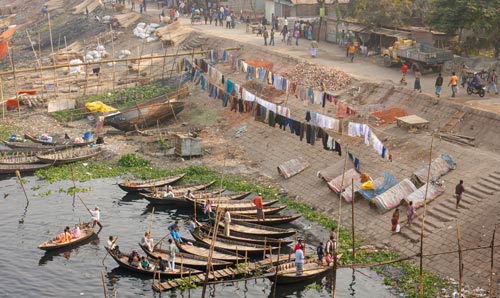
Brooks Doctoral College
The Rory and Elizabeth Brooks Doctoral College is the first of its kind to focus on postgraduate research of international development.
How to apply
Find out more about applying to be a PhD student at The University of Manchester
Fees and funding
We provide a number of funding opportunities for our GDI PhD students, find out more and apply.

Economics PhD programme
Our PhD in Economics is designed to train students for a rewarding career in economic research. With our 5-year programme, students receive rigorous training and sufficient time for producing original research.
Admission to the PhD programme is highly competitive as we typically only admit roughly 8-10 students per year, all of whom are usually funded. We place a high value on attracting the best minds, who will become valued members of our active research environment. Our students typically go on to teaching and research careers in academia, but also to positions in government, research institutions or the private sector.
Full Economics PhD course profile
We have launched a new five-year PhD programme, which consists of two years of coursework, followed by three years of independent research. Our new programme structure is aligned with that of top institutions in the US and the UK, providing students with rigorous advanced training and sufficient time for producing independent research. Furthermore, our training centre is part of the ESRC's accredited North West Social Science Doctoral Training Partnership (NWSSDTP) .
Over the first two semesters, students take eight courses, including compulsory units in macroeconomics, microeconomics, econometrics and mathematics. In the summer months, students then complete a dissertation, which is the first step towards the preparation of an eventual PhD thesis.
This year of the programme is equivalent to a MSc in economics. Students with a high level of performance in an equivalent degree can enter directly into year 1 of the programme.
In this year, students take advanced PhD-level courses. All students must take core units in macroeconomics, microeconomics, econometrics and research skills. Students must also choose one additional field course. Students may also be allowed to take additional units from one of our partner institutions within the NWSSDTP, from other departments at Manchester, or one of our advanced-level MSc units. There is also the option of taking units in subsequent years.
In addition to coursework, students also prepare a detailed research proposal. Since the research questions described in this proposal and the approach to addressing these questions are a significant part of the training in year 1, students are advised to start working on the research proposal as soon as possible.
Year 2 and beyond
After finishing the coursework, students have three years of independent research, with a possibility of an additional year (for writing up). In this phase, students will work on completing their job market paper, as well as other papers that will be part of their PhD thesis. Students will participate in the PhD conferences , which consists of both the internal conference and the NWSSDTP conference. Students are also expected to attend regularly research seminars in their field and the Manchester Economic Seminar series .
It is expected that during these three years, students will produce three pieces of substantive work, at least two of publishable quality. Submission to at least one international conference in economics is also expected and highly recommended.
In addition, students must present their work at least once in a weekly seminar related to their research area. PhD students also organise a weekly seminar series, and students are expected to attend and present in this seminar series as well.
Supervision
Normally, a student's supervisory team will consist of a main supervisor and a co-supervisor. Students are assigned a supervisory team upon entry into the programme, regardless of point of entry (i.e., year 0 or year 1).
When applying to our PhD programme, students are advised to identify potential supervisors . Details on recent publications, ongoing projects and research interests are all available on our academics' profiles. Although guarantees cannot be made, we will do our best to match your area of research to the most suitable supervisor.
Your potential supervisor should be able to give you advice on developing your research proposal , which must be included with your application to the programme.
Almost all of our students receive some form of funding. All of our applicants will be considered for scholarships from the University, which cover tuition fees and include a stipend. There is also the possibility to compete for ESRC funding . To search for current funding opportunities, please use our funding database search tool .
We view teaching experience as an integral part of the PhD programme. Therefore, PhD students are provided the opportunity to work as Graduate Teaching Assistants (which is paid), beginning in their second year.
In recent years, some of our students have completed internships at the European Central Bank and the Bank of England during the course of their studies.
The department provides resources to support students going on the job market. This includes practice interview sessions, as well as introductory talks on the European and American academic job markets. These talks are aimed towards year-five PhD students, but are open to all students.
In recent years, our PhD students have obtained research positions at universities, central banks and policy institutions. Please see a list of our recent placements .
How to apply
Apply to the Economics PhD programme using the university's online application system .
- Student intranet /
- Staff intranet

Department of Chemical Engineering

Postgraduate research in chemical engineering
Our breadth of research expertise and highly advanced facilities make us an ideal choice whatever your doctoral interest.
Facilitating research across chemical engineering and bioscience, chemistry, mathematics and analytical and measurement science, means we can offer you the benefits of a large multidisciplinary institution at the same time as ensuring you are given personal support for your professional development.
Explore postgraduate research in chemical engineering
Browse our range of chemical engineering PhD, MPhil and MSc by Research postgraduate research programmes.
Search research programmes >>
Live projects
Start your PhD journey by finding a research project that you’re passionate about.
Search live projects >>
Supervisors
Getting in touch with a potential supervisor for your project is a crucial part of your PhD journey.
Search for supervisors by name or area of study >>
Browse research themes and find supervisors linked to each theme >>
There are lots of ways you can secure funding for your postgraduate research. Browse our funding pages to find out about available scholarships, studentships and awards before speaking to your supervisor for further guidance.
Find funding >>
Centres for Doctoral Training (CDTs)
Find out more about fully funded PhD opportunities available through our CDTs, where you can combine research with practical training as part of a cohort and collaborate across research areas, institutions and industry.
Explore CDTs >>
Start your new tomorrow. Find out how to submit an application.
How to apply >>
Discover your tomorrow
Get ready for a life changing experience like no other; find out about postgraduate research at The University of Manchester.
Discover more about our research
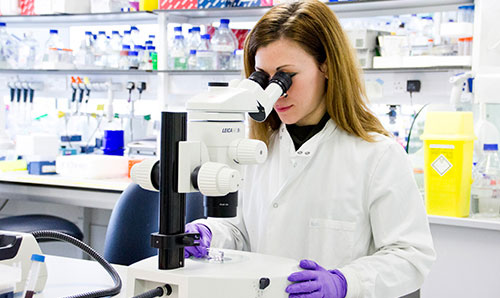
Advanced functional materials and analytical science
Development and analysis of a wide range of advanced functional materials.
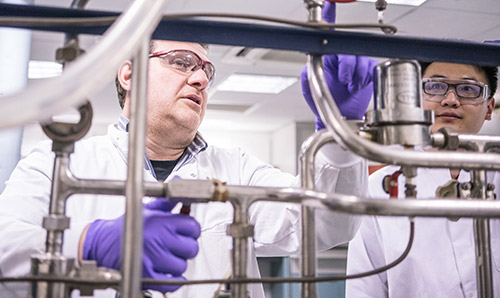
Biochemical and bioprocess engineering
The sustainable biological production of a wide range of products using advanced technologies.
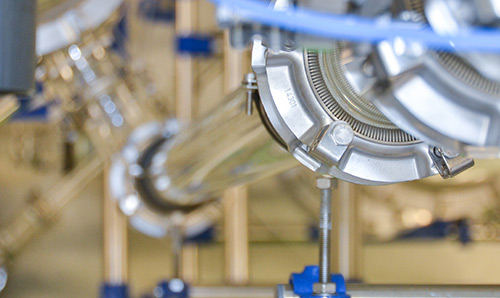
Catalysis and porous materials
Research into heterogeneous catalysis, membranes and separations, porous media and more.
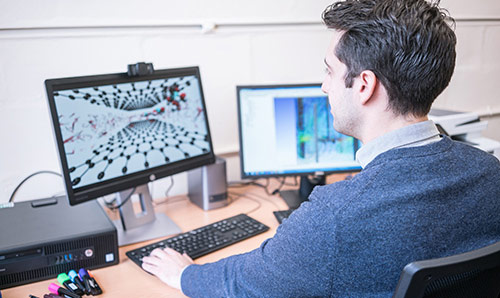
Multi-scale modelling
Development and use of modelling and simulation tools to address research challenges.

Process integration
The design, optimisation and control of chemical and biochemical processes.
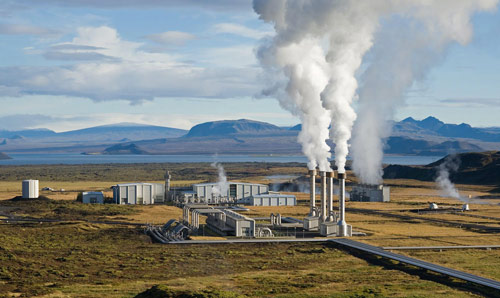
Subsurface energy systems
Subsurface systems play a critical role in the transition from fossil fuels to sustainable energy.
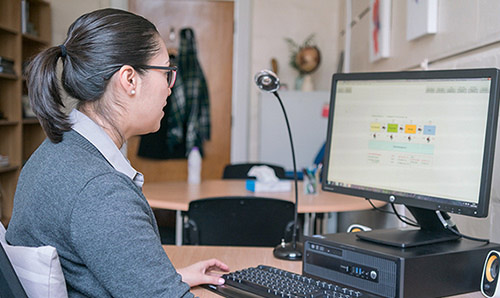
Sustainable industrial systems
Identifying sustainable solutions for industrial systems on a life cycle basis.
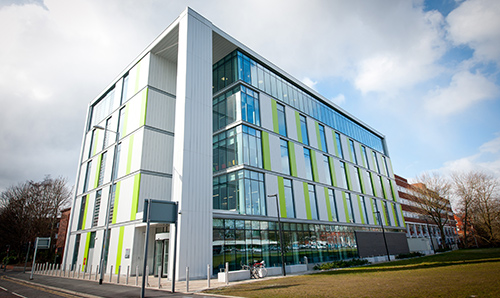
Our staff and students have access to the University’s range of excellent modern facilities.
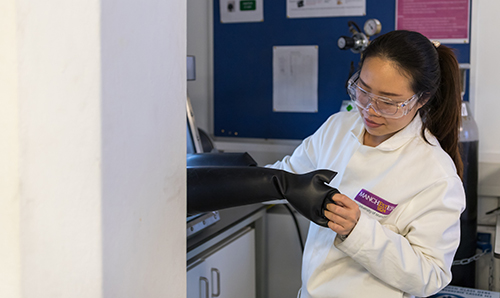
Centres and institutes
We work with a number of interdisciplinary University research centres and institutes.

Start your PhD journey
Browse projects built on your research passion, find a supervisor that shares your vision and discover how your PhD could be fully funded.

Find your project
Search our projects database to find available postgraduate research projects. You can filter by research area, supervisor or funding type to find the right projects for you.
The database below contains all of our advertised projects including funded PhD programmes such as our Doctoral Training Partnerships (DTP), competition funded projects and self-funded projects.
- Student intranet /
- Staff intranet

Department of Chemistry
Postgraduate research programmes for entry in 2024
Find below a list of postgraduate research programmes available in the Department of Chemistry.
There a number of different programme options available. Which one you choose will depend on your qualifications to date and the qualification you hope to achieve. You can choose from the following:
A PhD is usually a three or four year course where you are awarded a doctorate. To apply for a PhD you need to have completed a bachelor's (honours) degree with a minimum grade of a 2:1 (upper second class), or an international equivalent, in a relevant science discipline.
An MPhil is a one year research programme and can lead into a PhD. If you would like to apply to an MPhil course, you need to have achieved at least a 2:2 (lower second class) in your bachelor's (honours) degree, or an international equivalent, in a relevant science discipline.
MSc by Research
An MRes degree is a one year master's degree completed by conducting research. It is a useful preparatory experience if you are considering studying to PhD level. To apply for our MRes courses we need you to have achieved a 2:2 (lower second class), or an international equivalent, in a bachelor's (honours) degree. This needs to be in chemistry, analytical chemistry or another related chemistry discipline.
Your search returned no results.
If the list of programmes is taking a long time to load or you have JavaScript disabled you may view a simple A-Z list of programmes instead.
Search for programmes by entering keywords or browse an A-Z list of programmes .
Research projects
Search our projects database for studentships and postgraduate research opportunities.

PGR handbook - School of Environment, Education and Development
PhD programmes
Please select your area of study for more information:
Architecture
Global development institute, manchester institute of education, planning and environmental management, programme length.
The PhD programme is a 3 years/3.5 years full-time programme or 6 years/7 years part-time. The letter you received from the University offering you a place on the PhD programme specifies your registration period and the deadline for submission of your thesis.
Programme structure
Your PhD at SEED is an individual combination of these three key elements:
Supervised research
Throughout your PhD you will be planning, executing, analysing and writing up your research. You will commence work on your research from the start of your PhD. Your research work will be complemented and supported by a comprehensive research training programme during your first year.
More details on how your research is supervised and supported:
- Progress and reviews
Research training
You will follow a structured programme of research training in the first year, which complements your developing research. During your first year, you will spend around 60% of your time developing the advanced research and transferable skills and specialist knowledge that you will need to plan your doctoral research. Further training opportunities are available throughout the programme, from SEED and other providers. You are encouraged to regularly review your training needs and to take advantage of relevant opportunities to enhance your research skills.
More details on the SEED Research Training Programme:
- SEED research training
- Researcher development
The emphasis is on personal and professional skills required to produce a high-quality PhD, as well as the career development that will enhance employability and the ability to make the most of opportunities that arise. Many of the training and development opportunities offered outside the formal research training programme are linked to the Researcher Development Framework.
More details on the Researcher Development Framework;
Programme rules
The rules governing the PhD are embodied in the Ordinances and Regulations and the University’s Code of Practice for PGR Degrees. You are also bound by the University’s General Regulations.
More details on the policies and regulations that govern your programme:
- Policies and regulations
PGRs on dual PhD (Manchester-Melbourne) programme should contact [email protected] for any queries and requests.
Architectural research at The University of Manchester is intrinsically inter-disciplinary, encompassing areas in which the School already has strong interests – such as urban design, urban development, ecological and landscape design and the conservation and management of historic environments.
Research is carried out within the Manchester Architecture Research Group (MARG). MARG draws upon a wide range of interdisciplinary research and teaching interests within the School, the Faculty of Humanities, the University and the Faculty of Art and Design at Manchester Metropolitan University (through the joint Manchester School of Architecture).
- Manchester School of Architecture
- Manchester Architecture Research Group
We also have research and teaching links to other schools such as structural engineering within the School of Mechanical, Civil and Aeronautical Engineering, art history and archaeology within the School of Arts, Languages and Cultures and popular culture within Social Sciences.
- School of Mechanical, Aerospace and Civil Engineering
- School of Arts, Languages and Cultures
- School of Social Sciences
The opportunities for collaborative architectural research in the University are unparalleled, and research bids in a variety of disciplines are strengthened by the involvement of strong architectural researchers.
Architecture staff at Manchester also engage in research projects in collaboration with other institutions.
Architecture students can expect to work across multiple buildings including the Arthur Lewis Building, Humanities Bridgeford Street and Manchester Metropolitan University.
Discipline Co-ordinator for Architecture is Dr Lukasz Stanek
- Dr Lukasz Stanek
Head of Architecture is Dr Raymond Lucas
- Dr Raymond Lucas
Further information
Visit the MARG website to find out more about MARG staff, students and associated colleagues.
View a list of Architecture research projects
- Architecture research projects
The University of Manchester is one of the UK’s leading centres for geographical research.
We were ranked sixth in the UK and eighth in the world for Geography in the QS World Rankings 2013. You will benefit from custom-built physical geography laboratories, cutting edge computer software and one of the UK’s best university libraries. We produce research of global excellence, with 94% of our research activity considered internationally recognised and 65% defined as world leading or internationally excellent in the 2008 RAE.
Geography is home to five research groups:
- Cities, Politics and Economies Research Group (CPERG)
- Environmental Processes Research Group (EPRG)
- Mapping: Culture and Geographical Information Science (MCGIS)
- Quaternary Environments and Geoarchaeology (QEG)
- Society and Environmental Research Group (SERG)
Over half of our staff hold editorial positions with leading research publications. We also have strong working relationships with research centres within and beyond our School; our researchers also work closely with The Centre for Urban Resilience and Energy (CURE) and The Centre for Urban Policy Studies (CUPS).
- Find out more about Geography staff
- Find out more about current Geography PhD students and what they are studying
- Discipline Co-ordinator for Geography is Prof Phil Hughes
- Head of Geography is Prof Jamie Woodward
Follow us on Twitter:
- @ GeographyUOM
We are the largest university based postgraduate centre specialising in international development and one of the world’s leading centres for research on international development issues. We are renowned internationally for our quality research and address some of the most pressing and immediate global problems. We have a large and diverse postgraduate population and alumni network that stretches around the world.
Our graduates are employed by the world’s major development agencies and universities in roles such as government ministers, policy makers, economists and civil servants. We promote social and economic development and the reduction of poverty by enhancing the capabilities of individuals and organisations through education, research and policy analysis, particularly within lower-income countries and for disadvantaged groups. In the most recent Research Assessment Exercise (RAE 2008) 65% of our research activity was judged to be ‘world leading' or ‘internationally excellent’.
Our research has been consistently rated at the highest level and we have regularly produced world class and cutting edge research that have made significant impact to individuals, institutions and societies around the world.
Our activities include research into major areas of development policy and practice including
- poverty alleviation;
- development finance;
- human resource management and capacity building;
- information systems;
- public sector reform;
- institutional and organisational change and development;
- economic and social development;
- impact assessment and sustainable development;
- resource management;
- sustainable livelihoods; and
- the environment.
The combined field experience of our staff covers over 60 countries in Asia, Africa, Central and South America and the Pacific.
- The Brooks Chair and Director of the Doctoral College is Prof Phil Woodhouse
- Dr Admos Chimhowu is the Brooks Fellow and Deputy Director of the Doctoral College
- Visit our GDI people page
- Visit our current PhD students page in the the Rory and Elizabeth Brooks Doctoral College for information about their research
- @GlobalDevInst
The Manchester Institute of Education approach to research is distinctive through a focus on equity and practice, making a significant contribution to the University’s goal of social responsibility.
Our aim is to ensure that research is at the cutting edge of theory and practice, and that it contributes to improvements in the overall quality of education for students, their families and communities in educational settings throughout the world.
Productive partnerships with policymakers and practitioners have been developed in order to interplay ideas, evidence and strategy.
Find out more about MIE research groups :
- Critical Education Policy (CEP)
- Critical Pedagogies (CP)
- Disadvantage and Poverty (DP)
- Education and Psychology (EP)
- Find out more about Manchester Institute of Education staff
- Find out more about current student research within the Manchester Institute of Education
- Discipline Co-ordinator for MIE is Dr Pauline Prevett
- Head of the Manchester Institute of Education is Prof Neil Humphrey
We are one of the longest established and largest professional recognised planning schools in the UK, renowned internationally for the quality of our research. We place a strong interdisciplinary emphasis on our work, with all our staff working across a number of research areas. We have an excellent graduate employment record and strong professional links with planners, urban development professionals and environmental managers, particularly in Manchester.
We have an active research culture with a strong commitment to working at the cutting edge of current practice. In the most recent Research Assessment Exercise (RAE 2008) 60% of our research activity was ranked as ‘world leading’ or ‘internationally excellent’. In the past five years we have attracted more than £2.5 million in research and training contracts. Our PhD students benefit from being integrated into our vibrant, multidisciplinary research community.
Our postgraduate research students are regarded as an integral part of our research culture, and we recruit high calibre students from all over the world to join our diverse and international team. Students undertake their research studies in the UK and a wide range of countries worldwide.
- Discipline Coordinator for Planning and Environmental Management is Dr Adam Barker
- Head of Planning and Environmental Management is Richard Kingston
- Find out more about Planning and Environmental Management staff
- Find out more about current student research within Planning and Environmental Management
- @ PlanningUOM

PhDs in Science and Engineering


Dean’s Doctoral Scholarship
Have you got the passion to work on challenging projects in a world-leading research environment? Every year we support researchers of the highest calibre with a Dean’s Doctoral Scholarship.
Benefits of the scholarship
- Working with the world’s brightest minds to find solutions that make a difference.
- 3.5 years fully-funded (includes tuition at UK or international rate).
- + Annual maintenance stipend (equivalent to the UKRI minimum).
- + £1000 a year RTSG Transferable skills training programme.
Open to all nationalities, the Dean’s Doctoral Scholarship provides students with the chance to make a difference and become part of an innovative research community whose work changes lives.
Apply now and transform your future.
Eligibility criteria
In order to be considered for this scholarship, candidates must meet the following criteria:
- Have submitted an application by the deadline for a PhD programme to start in September 2024.
- Hold (or expect to achieve) a First Class or 2:1 UK honours degree (or international equivalent).
- Ideally hold a master’s-level qualification at merit or distinction (or international equivalent).
- Meet English language entry requirements as specified by the department that you are applying to.
- Be able to demonstrate potential for academic research. This may include contributions to publications/articles, promoting their research to a wider audience, prizes for research or project work.
We will only consider candidates who hold a formal offer for a place on one of our PhD programmes.
Equality, diversity and inclusion is fundamental to the success of The University of Manchester, and is at the heart of all of our activities. We know that diversity strengthens our research community, leading to enhanced research creativity, productivity and quality, and societal and economic impact. We actively encourage applicants from diverse career paths and backgrounds and from all sections of the community, regardless of age, disability, ethnicity, gender, gender expression, sexual orientation and transgender status.
We also support applications from those returning from a career break or other roles. We consider offering flexible study arrangements (including part-time: 50%, 60% or 80%, depending on the project/funder).
All appointments are made on merit.
Application process
How to apply.
Find out how to submit your application online.
Apply now >>
- Choose your research project and find your supervisor .
- This scholarship works on a nomination basis so it’s important you make sure you have had significant contact with your supervisory team during the application process and that they are aware that you wish to be considered for funding.
- Complete your application prior to the advertised funding deadline (see key dates below).
- Specify in the funding section of your PhD application form that you wish to be considered for the Dean’s Doctoral Scholarship.
- Each Department will be invited to nominate candidates to Faculty – if nominated you will then be invited to an interview.
Full details of how to apply for postgraduate research, where to find research projects and supervisors, and much more can be found on our postgraduate research page .
Please direct any enquiries to the relevant postgraduate research contact in each Department.
Application deadlines
Applications for this scholarship will be considered in two batches throughout the academic year, running until 31 March 2024.
- If you apply for this scholarship before 31 January 2024 and you're nominated by your supervisor, you'll be interviewed in March and notified if you have been awarded a scholarship by 28 March 2024.
- If you apply for this scholarship between 1 February 2024 and 31 March 2024 and you're nominated by your supervisor, you'll be interviewed in May and notified if you have been awarded a scholarship by 31 May 2024.
Any questions? Get in touch with the Department your PhD would be based in.
Find out more
- Student intranet /
- Staff intranet

Department of Materials

Postgraduate research in materials science and fashion business technology
We are the largest Department of Materials in Europe, attracting the best research talent from across the globe.
We are the home of graphene and our continued investment in materials includes the creation of our £235 million Henry Royce Institute.
Whether your interests lie in hard science subjects such as biomaterials or metallurgy, or social science subjects such as consumer behaviour, marketing or business management, there are a range of study packages and funding options available to you.
Explore postgraduate research in materials and fashion
Browse our range of materials and fashion PhD, MPhil and MSc by Research postgraduate research programmes.
Search research programmes >>
Live projects
Start your PhD journey by finding a research project that you’re passionate about.
Search live projects >>
Supervisors
Getting in touch with a potential supervisor for your project is a crucial key of your PhD journey.
Search for supervisors by name or area of study >>
Browse research themes and find supervisors linked to each theme >>
There are lots of ways you can secure funding for your postgraduate research. Browse our funding pages to find out about available scholarships, studentships and awards before speaking to your supervisor for further guidance.
Find funding >>
Centres for Doctoral Training (CDTs)
Find out more about fully funded PhD opportunities available through our CDTs, where you can combine research with practical training as part of a cohort and collaborate across research areas, institutions and industry.
Discover more >>
Start your new tomorrow. Find out how to submit an application.
How to apply >>
Discover your tomorrow
Get ready for a life changing experience like no other; find out about postgraduate research at The University of Manchester.
Discover more about our research
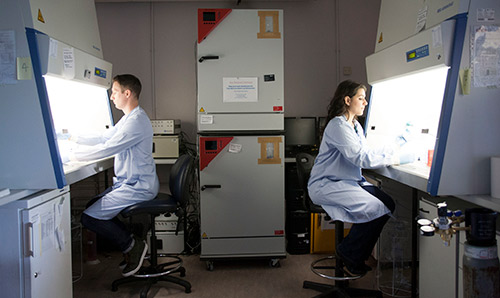
Biomaterials
The development of new materials, from their chemical synthesis to their use for medical treatment.
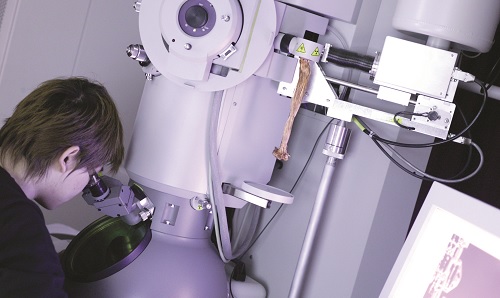
Coatings and ceramics
Research into the development of advanced ceramics and coatings for structural and functional applications.

Fashion management and marketing
The research of operations management, consumer behaviour and more, in fashion and textiles.
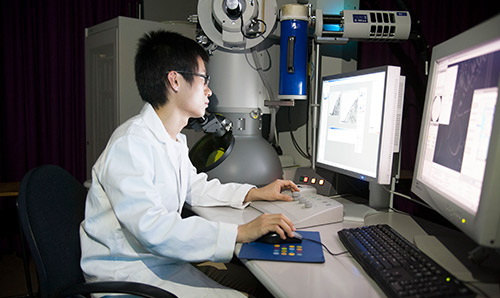
Imaging and characterisation
Research into advanced materials conducted by using a suite of outstanding X-ray and microscopy facilities.

Metallurgy and corrosion
A research area dedicated to the performance of metals and alloys in demanding environments.

Nano and functional materials
The development and study of novel nanomaterials for their application in key technological areas.

Polymers and composites
Research focused on developing advanced polymers and multi-functional composites.
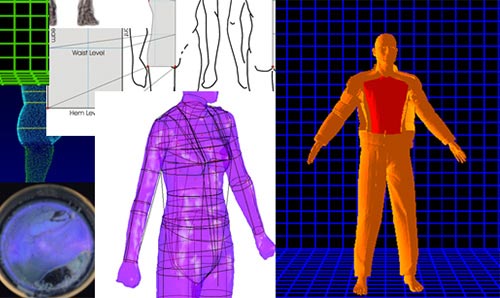
Textiles and apparel
We're developing advanced textile materials, technologies and products for a variety of applications.
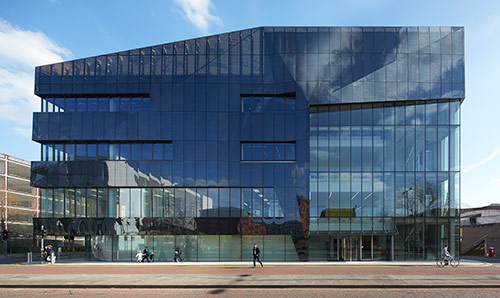
Centres and institutes
Our school is home to research centres that specialise in aerospace innovation and material performance.
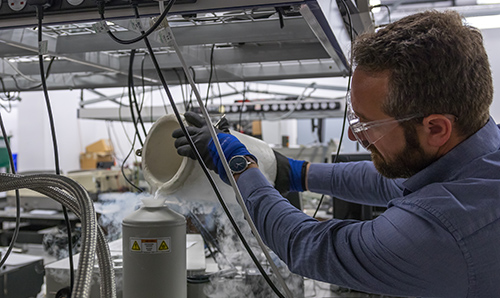
To underpin our research and teaching activities, our school is home to a range of modern facilities.

Start your PhD journey
Browse projects built on your research passion, find a supervisor that shares your vision and discover how your PhD could be fully funded.

Postgraduate research (PhD)
Use academic insights to create just and sustainable digital futures for development.
We host more than twenty doctoral researchers studying various aspects of the connection between socio-economic development and digital systems/data.
You can apply for our PhD research programmes through either the Global Development Institute (GDI) or the Alliance Manchester Business School (AMBS):
- Development Policy and Management PhD (GDI)
- The Alliance Manchester Business School PhD
Scholarship and funding
Details of PhD scholarships are available online:
- Funding opportunities in GDI
- Funding opportunities in AMBS
Research focus
The Centre has a particular interest in candidates working in areas complementary to our focal research themes, especially:
- artificial intelligence and development
- data-intensive development
- data justice
- data science and development
- digital economy
- digital inequality
- digital labour
- digital platforms
- digital startups
- digital trade
- digital transformation
- e-agriculture
- e-/m-health
- e-resilience
- gender implications of ICTs
- ICT4D champions
- ICTs and civil society organisations
- industry 4.0
- political economy of digital development
Eligibility
We are looking for those with:
- a high merit or distinction level masters degree from an internationally recognised university in an appropriate topic (e.g., information systems, management, or development, among others);
- good English skills; and
- a relevant topic for study, backed by a proposal that demonstrates an ability to work with academic theory.

The Manchester PhD Degree
One of the most highly respected doctorate degree programmes across the globe.
The Alliance Manchester Business School PhD degree provides world-class facilities and a supportive research environment in which to study and develop the essential skills for a successful career, whether in academia or industry.
We offer PhD programme pathways in Accounting and Finance, Business and Management, and Science, Technology and Innovation Policy in our continued mission to develop socially responsible business and management researchers and research. Our PhD programmes are offered on a 4-year full-time or 8-year part-time basis.
Experience a thriving, internationally renowned research community with interdisciplinary links to key areas across the University such as engineering, health, mathematics and social sciences.
Engage in continuous skills training and research support activities throughout this Doctor of Philosophy programme to support your academic and research needs.
Develop a set of crucial transferable skills such as presenting, writing and resilience that will set you apart throughout your career.
Why study a PhD degree at Alliance Manchester School?
in the UK for research power (REF 2021)
international centres: Dubai, Hong Kong, Manchester, São Paulo, Shanghai and Singapore
- Full-time: 4 years
- Part-time: 8 years
The Manchester PhD Degree
We continue to attract outstanding researchers of the highest calibre and our PhD population is one of the largest in the UK, with around 45 researchers joining us each year. As a graduate of one of the world's most innovative and ambitious doctoral research schools, you'll be sought after by leading universities, top business schools, government institutes and private sector organisations.
We embed the PhD into the research life and culture of the School by assigning you to research centres and groups . You will be active in the research life of your centre, organising external seminars, presenting your work to peers in internal seminars, and designing and presenting posters on your PhD.
Whatever your future plans, make the most of your exceptional talents with a PhD from Alliance MBS and give yourself the opportunity to make an impact.
Entry requirements
You will need to check that you meet the PhD degree requirements before submitting an application.
There are a number of PhD funding opportunities available at the School across numerous academic subjects.
Contact the Humanities Doctoral Academy Admissions Team
For further information, please contact us at:
+44 (0)161 275 1200
Find a supervisor
View funding options
Choose your PhD pathway
Research support.
We are committed to supporting your academic and research needs.
Doctoral Research Conference
This annual event forms a key part of the Research Training Programme for first year PhD researchers, providing an opportunity to present and gain feedback on their research from an engaged audience. Leading researchers from the School and external experts deliver presentations and workshops on key topics and there are opportunities for those at a more advanced stage of their studies to engage with, and enhance, the School’s research community.
Development workshop
This workshop, specifically aimed at first year PhD researchers helps the cohort to settle into the programme.
Presentation skills workshop
Aimed at second year PhD researchers, this practical workshop builds your communication and presentation skills which are crucial for your professional career. There is a mix of activities such as individual coaching, group exercises, interactive scenarios and one-to-one training.
The work draws on the rehearsal model of experimentation and feedback which aims to encourage you to experiment and adopt new behaviours by working on posture, pauses, volume and other skills.
Writing retreat
Aimed at final year PhD researchers, the 2-day writing retreat enables you to progress your writing projects and produce a range of written outputs, typically PhD chapters, books, conference abstracts, journal articles and research proposals.
Benefits of the session include:
- Growing research-oriented interactions and relationships
- Building confidence in research and writing
- Creating cross-disciplinary research conversations
Conference and fieldwork support
You will be able to take advantage of a range of support available from both the School and the University to cover conference, travel and research related expenses.
Specialist business databases
The University Library's Business Data Service provides access to excellent database facilities and extensive data management support including:
- WRDS (CRSP, Compustat, TAQ, Optionmetrics, Board Ex, Execucomp, FISD)
- Thomson One Banker
- Global Financial Data
- Thomson Reuters Tick History
Find out more about the Library's Business Data Service >>
Research training programme
Throughout the PhD programme you follow a robust, systematic and flexible research training programme designed to:
- Help you plan and write your PhD thesis
- Introduce you to the variety of research undertaken at the School
- Equip you with the skills to become a leading researcher
As a doctoral researcher, you will choose from the following core units when forming your Research Training Programme. Please note that offerings are subject to change.
PhD Accounting and Finance • Advanced Financial Theory • Advanced Finance Research Seminar • Current Issues in Empirical Finance • Advanced Financial Accounting Theory • Market Based Accounting Research • Advanced Accounting Research Seminar • Assurance and Credible Reporting
PhD Business and Management • Research Philosophy and Introductory Methodological Issues • Developing Research Contributions • Quantitative Research Methods • Qualitative Research Methods
PhD Science, Technology and Innovation Policy • Developing Research Contributions • Advanced Topics in Science, Technology, and Innovation Policy • Scope and Theory in Science and Technology Policy • Advanced Methods in Science, Technology and Innovation Policy Analysis
Optional units
In addition to Core Units, you may also choose from the following elective units when forming your Research Training Programme. Please note that offerings are subject to change.
PhD Accounting and Finance • Advanced Corporate Finance • Additional Research Training • Qualitative Research Methodology • Units from the PhD Business and Management offerings • Units from the NWSSDTP (as part of the Module Exchange arrangements) • MSc units from the Economics Department
PhD Business and Management • Case Study Research • Comparative Case Study Analysis • Epistemology • Exploratory Factor Analysis • Introduction to Qualitative Data Analysis using NVivo • Multiple Regression • Navigating the Publication Process • Reviewing and Evaluating Manuscripts • Structural Equation Modelling • Units from the NWSSDTP (as part of the Module Exchange arrangements)
PhD Science, Technology and Innovation Policy • Introduction to Quantitative Research Methods • Quantitative Methods • Qualitative Research Methods • Units from the NWSSDTP (as part of the Module Exchange arrangements)
Specialist subject units
You can also choose from a range of subject-specific units that cover the wide variety of specialisms studied at PhD level. Subject areas include:
- Accounting and Finance
- Corporate Strategy
- Decision Sciences and Operational Research
- Healthcare management
- Human Resource Management
- Information Systems
- International Business and Management
- Operations Management
- Organisational Psychology
- Organisational Studies
- Public Sector Management
- Science, Technology and Innovation
Library services
You will have access to a wide range of bespoke services and support throughout your PhD.
Exclusive study space
You will have access to exclusive postgraduate-only study space which facilitates both group and private study. You will also have access to all sites of The University of Manchester Library – one of the UK's largest and best resourced academic libraries.
Online data sources
You will have access to one of the largest collections of specialist information sources in the UK. Search for journal articles from top-ranked peer-reviewed publications or access a wide range of data and reports from a variety of market-leading information providers such as Thomson Reuters, Mintel and Euromonitor.
Specialist financial datasets
The Finance Zone gives you access to one of the UK’s most comprehensive collections of specialist financial databases used by top researchers around the world including Bloomberg, Capital IQ, Compustat, Datastream, Thomson ONE, WRDS plus many more.
Read more about the Finance Zone >>
Training programmes
The Business Data Service runs specialist training sessions throughout the academic year focusing on a wide range of research, tools, skills and techniques including EndNote and SPSS. We also provide tuition on our full suite of specialist financial business datasets and guidance on obtaining certification for the Bloomberg and Datastream platforms.
Find out more about the Business Data Service >>
You will have access to a dedicated stock of business, management and research-based titles.
Tailored induction
You will receive a tailored induction to the library service focusing on research needs at doctoral level.
Daily updates
Research snapshots and updates delivered via Twitter. Our dedicated research blog ‘Business Research Plus’ will keep you up-to-date with all the latest tips and expertise from the Alliance MBS Library Team.
Support services
Research consultation sessions provide drop-in clinics for business data queries. You can also book a one-to-one consultation appointment with a member of the Business Data Service team and we are happy to provide tailored support for individual research projects. This is supplemented by online support services that are available at any time.
Career opportunities
The Manchester PhD prepares you for a research career in academia or for opportunities in business, government and non-profit organisations.
Graduates have progressed to positions at the following organisations:
- Bank of America
- Banque de France
- Booth School of Business at the University of Chicago,
- CASS Business School
- Central Bank of Chile
- Lancaster University
- London Business School
- London School of Economics
- Morgan Stanley
- Singapore Management University
- Universidad de Chile
- University of Leeds
- Warwick Business School
Other research options
Master of philosophy (mphil).
The Master of Philosophy is a one-year full-time, or two-year part-time, postgraduate research degree. You will carry out a substantial research project and may take advantage of the research training available to PhD students.
Master of Research (MRes)
The Master of Research in Management is a one-year full-time, or two-year part-time, Masters degree designed to give you the opportunity to build your knowledge of specialist areas of business and management and to develop the research skills essential for doctoral research. Many students who complete an MRes go on to apply for a PhD.

PhD researcher wins major award for climate impact research
Monday, May 16, 2022
PhD researcher Tiancheng Yu has been honoured by the UK Academy of Sustainable Finance, Accountability and Governance (ASFAAG) for co-authoring a major study into the impact of environmental regulations on businesses. >>
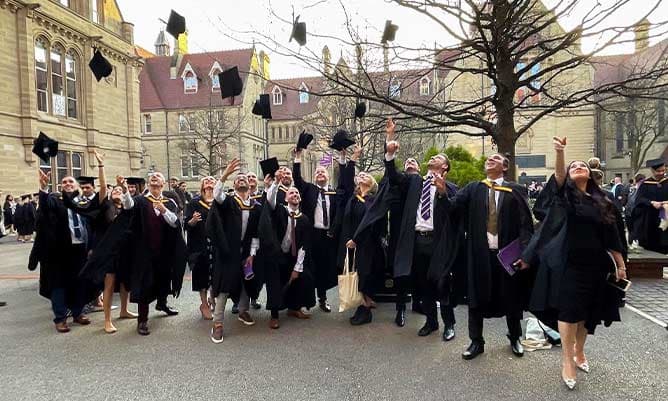
Classes of 2020 and 2021 celebrate their graduation
Monday, April 4, 2022
Alliance MBS 2020 and 2021 celebrated their graduations on campus on 24 and 25 March. >>

PhD researcher wins award from Alan Turing Institute
Wednesday, November 3, 2021
Alliance MBS PhD researcher Thu Trang Dinh has been recognised by one of the most prestigious organisations in data science. >>

PhD student receives posthumous degree
Friday, July 30, 2021
Alliance MBS PhD student Nestor Romero, who passed away last year, is to be awarded a posthumous degree from The University of Manchester. >>
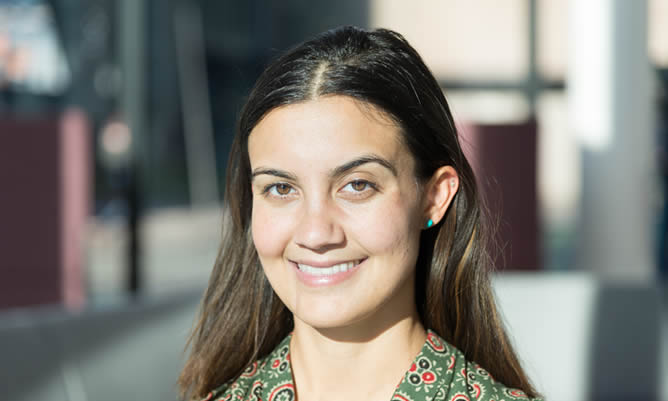
AMBS PhD researcher wins University Making a Difference Award
Monday, June 7, 2021
Congratulations go to Alysha Shivji, AMBS PhD researcher, who has won the 2021 University of Manchester’s Making a Difference award for Outstanding Benefit to Society Through Research. >>
View PhD news
Take the next steps...
- How to apply
- Find a PhD supervisor

Alternatively, use our A–Z index
Attend an open day
BSc Global Development with International Study / Careers
Year of entry: 2025
- View full page
Career opportunities
With over 10,000 alumni across the globe, the Global Development Institute has helped launch many careers over the years. We have educated a large number of postgraduate students over recent years and are now launching a brand-new undergraduate course with the focus of building the foundation for a career in the development sector. Our course units have been designed to ensure you graduate with the research and professional skills you need to pursue your chosen career.
Learning in our state-of-the-art classrooms and computer laboratories, the course will equip you with excellent subject knowledge, while also developing your transferrable skills, such as communication, data analysis, research and problem-solving.
What’s more, the Global Development Institute is highly diverse with both students and academics from across the globe, enhancing your intercultural skills – a valuable asset in today’s professional environment.
After your graduation, you will be well equipped for a wide range of positions in the public and private sectors working on developmental issues, including charities, non-governmental organisations, international organisations, governments, policy making, media or politics either in the UK or abroad. What’s more, the Global Development Institute offers over 20 master’s courses, allowing you to delve deeper into your chosen field.
Careers support
The University has its own dedicated Careers Service that you would have full access to as a student and for two years after you graduate. At Manchester you will have access to a number of opportunities to help boost your employability.
Careers support for international students
The Careers Service provide specialist resources, advice and events for international students to help with career planning and making the most of your time while studying in Manchester.
- Working in the UK after study
- Working during study
- Professional and alumni networks for international students
Global networks
The University of Manchester is proud to have the largest global alumni community of any campus-based university in the UK. International alumni groups are a great way to keep in touch with fellow Manchester graduates in your country. It is an opportunity to build professional and social networks.

IMAGES
VIDEO
COMMENTS
Postgraduate research. Study on a postgraduate research programme at Manchester and you'll be part of a community whose work has an impact on people's lives across the globe. With a breadth of research activity that's unrivalled in the UK, we work across disciplines and beyond the University, connecting the brightest minds to find ...
Find a PhD project. Search our database for all PhD/MPhil projects available at Manchester. You can filter by research area, supervisor or funding type to find the right projects for you. In addition to the projects listed here, we also welcome enquiries from students who are interested in conducting research in other areas. Use our programme ...
2nd in the UK for Education (Complete University Guide 2024). The University of Manchester was ranked in the top 10 in the UK for Education research (overall GPA, REF2021). Learn with research-active experts in the field of education and work with highly diverse cohorts of students and staff.
Let your referees know that the University will be contacting them directly for a reference. Prepare a research proposal /piece of academic writing, if required. This will be specified on the relevant academic School website. Prepare a personal statement/statement of purpose, if required. This will be specified on the relevant academic School ...
Start your PhD at The University of Manchester, and discover a world of science and engineering postgraduate research opportunities at our Doctoral Academy. ... A Manchester PhD could change your tomorrow. This is the place where the atom was split, graphene was discovered and AI was born. It could be your home too.
Search our subject areas to see what programmes are available. Our academic staff ensure we produce research that's recognised across the globe. Find out more about their work. Search for a postgraduate research programme or area of study, or find contact details for a researcher with whom you'd like to work.
PhD (full-time) UK students (per annum): Standard £4,786, Low £11,000, Medium £17,500, High £23,000 ... The University of Manchester is regulated by the Office for Students (OfS). The OfS aims to help students succeed in Higher Education by ensuring they receive excellent information and guidance, get high quality education that prepares ...
The University of Manchester offers postgraduate research degrees across a range of biological, medical and health science disciplines. Search for your subject below to see if we offer a PhD/MPhil degree in your area of interest. Most of our PhDs are available to study as an MPhil. See individual listings for more information.
The University of Manchester is ranked 27th worldwide (QS Global World Rankings 2022) and is #1 for social and environmental impact (Times Higher Education). We have been the University of the Year for Graduate Employment (The Times and Sunday Times Good University Guide 2020). ... Your PhD will be undertaken at Manchester under the supervision ...
Explore PhD programmes at The University of Manchester Faculty of Humanities, browse subjects, funding information, programme information and apply online. ... Politics at Manchester is one of the strongest groupings in the UK with a distinguished history as a centre of research, training, and education at undergraduate and postgraduate levels. ...
Year of entry: 2024. Streams : The 1+3 stream consists one year of PhD level teaching followed by 3 years of research. The 1+1+3 stream consists of one year of MSc teaching followed by the 1+3 stream. High level of performance: Achieving an average of 65% in coursework with no unit marks below 55% for both UG and PG degrees as well as 65% mark ...
Funded programmes. We offer several specialised PhD training programmes that come with funding. All of our fully funded programmes are displayed below including our prestigious doctoral training partnerships and industry funded schemes. Some of these programmes offer interdisciplinary or structured training during the first year or placements ...
Find out more about applying to be a PhD student at The University of Manchester. Read more. Fees and funding. We provide a number of funding opportunities for our GDI PhD students, find out more and apply. Read more. Contacts +44 (0)161 275 2817; Contact details; Find us The University of Manchester Oxford Rd Manchester M13 9PL UK.
Economics PhD programme. Our PhD in Economics is designed to train students for a rewarding career in economic research. With our 5-year programme, students receive rigorous training and sufficient time for producing original research. Admission to the PhD programme is highly competitive as we typically only admit roughly 8-10 students per year ...
Our breadth of research expertise and highly advanced facilities make us an ideal choice whatever your doctoral interest. Facilitating research across chemical engineering and bioscience, chemistry, mathematics and analytical and measurement science, means we can offer you the benefits of a large multidisciplinary institution at the same time ...
PhD Research Project Competition Funded UK Students. Application Deadline: 13 May 2024. Search for PhD projects in biological, medical and health sciences at The University of Manchester by research area, supervisor or funding type.
PhD. A PhD is usually a three or four year course where you are awarded a doctorate. To apply for a PhD you need to have completed a bachelor's (honours) degree with a minimum grade of a 2:1 (upper second class), or an international equivalent, in a relevant science discipline. MPhil. An MPhil is a one year research programme and can lead into ...
To apply for any programme in the Humanities Doctoral Academy, you must complete and submit the online application form. Please ensure to include all of the required supporting documents with your application. A list of required documents is given on the application and selection tab of each programme page. PhD Accounting and Finance. PhD ...
The PhD programme is a 3 years/3.5 years full-time programme or 6 years/7 years part-time. The letter you received from the University offering you a place on the PhD programme specifies your registration period and the deadline for submission of your thesis.
Benefits of the scholarship. Working with the world's brightest minds to find solutions that make a difference. 3.5 years fully-funded (includes tuition at UK or international rate). + Annual maintenance stipend (equivalent to the UKRI minimum). + £1000 a year RTSG Transferable skills training programme. Open to all nationalities, the Dean ...
We are the largest Department of Materials in Europe, attracting the best research talent from across the globe. We are the home of graphene and our continued investment in materials includes the creation of our £235 million Henry Royce Institute. Whether your interests lie in hard science subjects such as biomaterials or metallurgy, or social ...
The Centre has a particular interest in candidates working in areas complementary to our focal research themes, especially: artificial intelligence and development. data-intensive development. data justice. data science and development. digital economy. digital inequality. digital labour. digital platforms.
The Manchester PhD Degree. We continue to attract outstanding researchers of the highest calibre and our PhD population is one of the largest in the UK, with around 45 researchers joining us each year. As a graduate of one of the world's most innovative and ambitious doctoral research schools, you'll be sought after by leading universities, top ...
The University of Manchester is proud to have the largest global alumni community of any campus-based university in the UK. International alumni groups are a great way to keep in touch with fellow Manchester graduates in your country. It is an opportunity to build professional and social networks.